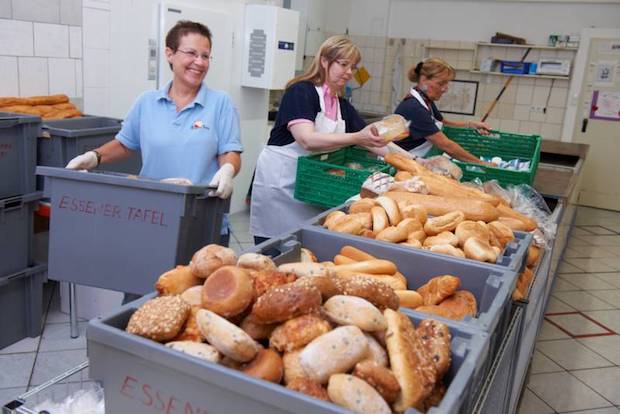No Food For Hungry Refugees?

In Germany, a food charity requires people to show a German passport before getting fed:
The charity Essener Tafel called it a temporary restriction necessary because the share of foreigners using the food bank had soared to 75% in recent years.
The charity says it helps about 16,000 poor people in Essen, a city in the western industrial Ruhr region.
Vandals have sprayed “Nazis” on the charity’s delivery vans.
Mrs Merkel spoke out against Essener Tafel’s new rule requiring visitors to show a German passport in order to receive food.
“One shouldn’t run services on the basis of such categorisations. That’s not good. But it also shows the amount of pressure there is, and how many people are needy. That’s why I hope they can find good solutions which do not exclude groups,” she told the broadcaster RTL.
The man who runs the charity says critics have it all wrong:
Earlier, he said the restriction had nothing to do with xenophobia; he said it was all about fairness, because large numbers of elderly women and single mothers had stopped coming to Essener Tafel.
What a terrible situation. On the one hand, it is repulsive that hungry people who don’t have German passports can’t get anything to eat from this group. On the other hand, if there is not enough food to feed poor and suffering Germans, what is the food bank supposed to do? Does not a nation have a primary (though not exclusive) obligation of charity to their own people?
If you go to the group’s website (browsing on Chrome allows you to instantly translate it to English), you’ll see that they’re based on an American model, in which they collect leftover food locally, and distribute it. The amount of food is not infinite; it’s based only on what people in Essen donate. What would you do if you were running the charity?
The answer is for the German federal government to get involved by augmenting the feeding of the refugees, given that the federal government caused the problem by taking in many more than Germany can absorb. I can’t see any justification for letting people go hungry. That said, people should leave Essener Tafel alone. What’s happening to them is, in part, an example of what happens when political elites ignore or push aside the interests of their own people. How is it fair for elderly, hungry Germans and single German mothers to do without food to feed foreigners invited en masse into the country by the government?
UPDATE: A German reader e-mails:
The thing is, the “Tafeln” have always drawn criticism, the main point being that caring for the poor should be the government’s responsibility. Effectively, the “Tafeln” were (and are) blamed for enabling the government to neglect its duties. I guess criticising a private charity for lightening the public welfare’s workload is a pretty alien concept for Americans, but there it is.
It is important to note, though, that the “Tafeln” were never meant as a surrogate for public welfare but merely as an augmentation. So if somebody doesn’t get food at the “Tafel”, that doesn’t mean they have to starve.
At the same time, I think the real problem the “Tafeln” (in Essen and elsewhere) are facing is NOT that there isn’t enough food. According to estimates, between 11 and 18 million tons of food products are wasted in Germany each year. About 100.000 tons are donated to the “Tafeln”. The main reason why they don’t get more than that is that they have to stick to very strict regulations regarding food safety. Plus, they’re running out of volunteers. In some places (other than Essen) hundreds of volunteers have quit after being insulted and assaulted by food recipients. Being labeled “nazis” after the Essen “refugee ban” uproar certainly won’t help either.
(Your reader “Matt in VA” has brought up the question whether elderly women and single mothers have stopped coming to the Essener Tafel “because the food bank runs out of food or because they don’t feel safe”. I think he’s on the right track there.)
One reason why I’m kind of concerned with this topic is that my wife volunteers for a grassroots charity campaign group called “Foodsharing” that collects unmarketable food products from bakeries, supermarkets and so on, and I sometimes help with that. The “Foodsharing” campaign is much less regulated than the “Tafeln”, so they can collect goods that the “Tafeln” won’t take. You wouldn’t believe the quantities of food my wife brings home sometimes. Good food. We eat some of it ourselves, but for the most part we donate it to soup kitchens, homeless shelters and the like.
Subscribe for as little as $5/mo to start commenting on Rod’s blog.